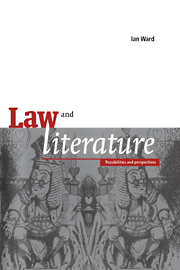Book contents
- Frontmatter
- Contents
- Preface
- PART I POSSIBILITIES
- PART II PERSPECTIVES
- 4 Shakespeare revisited
- 5 Children's literature and legal ideology
- 6 Law, literature and feminism
- 7 Law and justice in the modern novel: the concept of responsibility
- PART III TWO STUDIES IN CONTEMPORARY LITERATURE
- Notes
- Bibliography
- Index
5 - Children's literature and legal ideology
Published online by Cambridge University Press: 29 September 2009
- Frontmatter
- Contents
- Preface
- PART I POSSIBILITIES
- PART II PERSPECTIVES
- 4 Shakespeare revisited
- 5 Children's literature and legal ideology
- 6 Law, literature and feminism
- 7 Law and justice in the modern novel: the concept of responsibility
- PART III TWO STUDIES IN CONTEMPORARY LITERATURE
- Notes
- Bibliography
- Index
Summary
The literature which we read as children is the most influential and important that we ever encounter. In this chapter I want to examine the extent to which children's literature is jurisprudence. W.H. Auden suggested that with regard to children's literature there are essentially two questions: 'what insight do they provide as to how the world appears to a child?; and, to what extent is the world really like that?’ Auden?'s questions will serve as our guide in this chapter.
CHILDREN'S LITERATURE AND IDEOLOGY
As with the law and literature movement, academic study of children's literature is very much an emerging discipline. Indeed, much of the debate surrounds the issue of whether children's literature can or should try to establish itself as a discrete discipline. As children's literature has striven to establish itself from the middle of the nineteenth century, there has been a particular anxiety in stressing its differentness, as a counter to its often alleged inferiority as an academic discipline. The perceived ‘simplicity’ of language and ‘triviality’ of subject-matter in children's literature has encouraged its dismissal without the full appreciation of the relativity of a child audience. Although one of the great strengths of children's literature is its inter-disciplinary nature, in the past regrettably this strength has only added to its dismissal. It is its inter-disciplinary nature which makes children's literature a particularly appropriate subject for law and literature study, and it is the affective importance of children's literature which surely elevates the subject from the desirable to the necessary.
- Type
- Chapter
- Information
- Law and LiteraturePossibilities and Perspectives, pp. 90 - 118Publisher: Cambridge University PressPrint publication year: 1995

